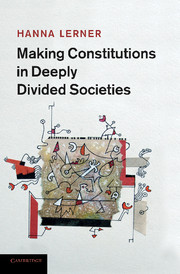Book contents
- Frontmatter
- Contents
- Acknowledgments
- Introduction
- PART I Constitutions, democracy, identity
- PART II Varieties of constitutional incrementalism
- 3 Informal consociationalism in Israel
- 4 Constructive ambiguity in India
- 5 Symbolic ambivalence in Ireland
- PART III Arguments for and against constitutional incrementalism
- Conclusion
- Bibliography
- Index
3 - Informal consociationalism in Israel
Published online by Cambridge University Press: 25 October 2011
- Frontmatter
- Contents
- Acknowledgments
- Introduction
- PART I Constitutions, democracy, identity
- PART II Varieties of constitutional incrementalism
- 3 Informal consociationalism in Israel
- 4 Constructive ambiguity in India
- 5 Symbolic ambivalence in Ireland
- PART III Arguments for and against constitutional incrementalism
- Conclusion
- Bibliography
- Index
Summary
We are an ancient people, who have lived thousands of years with no constitution – can we not continue to live without a constitution? … The debate over the fundamental constitution will last many years, and will involve the entire state of Israel and the Diaspora … Rather than concerning themselves with what needs to be done, Jews around the world dispute the constitution.
David Ben-Gurion, 1949The State of Israel was established in 1948 as a democratic state for the Jewish people. Although in the pre-state period the leaders of the Yishuv (the Jewish community in Mandatory Palestine) had begun discussions about the formation of a constitution, Israel has never adopted a formal constitution. From the beginning, the debate over the constitution concerned not only the content of the constitution but also the appropriate method of adopting it. The debate reflected the profound ideational divide over foundational issues, particularly the deep disagreement between a religious and a secular vision of Israel as a Jewish state.
The inability of the framers of the constitution to reach a consensus regarding the appropriate relationship between Jewish religious law and the institutions of the modern state led them to deploy a strategy of avoidance and to postpone the drafting of a written constitution. Despite an overwhelming secular majority in the first Knesset (Israel's parliament), the political leadership of the country preferred not to make controversial decisions regarding the foundational aspects of the constitution, adopting an incrementalist approach instead.
- Type
- Chapter
- Information
- Making Constitutions in Deeply Divided Societies , pp. 51 - 108Publisher: Cambridge University PressPrint publication year: 2011



